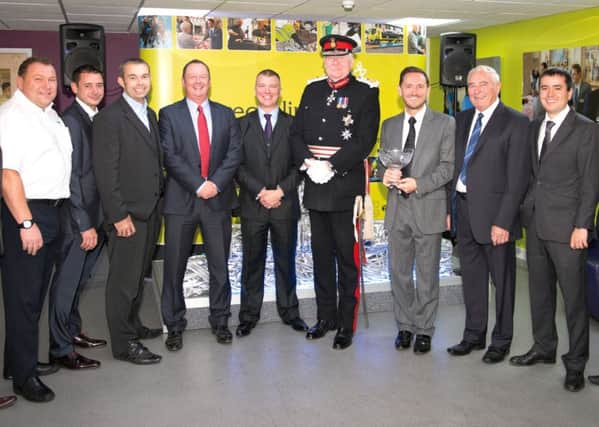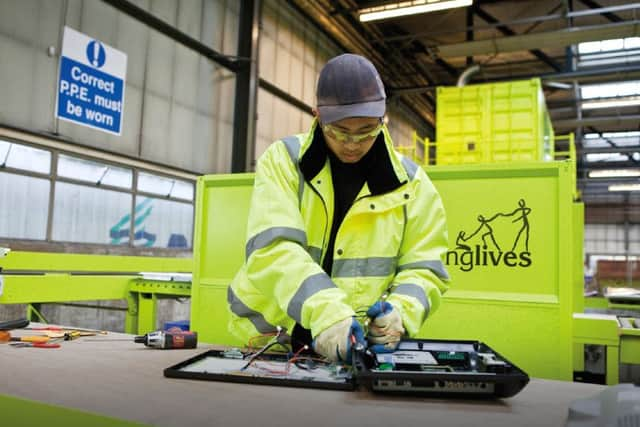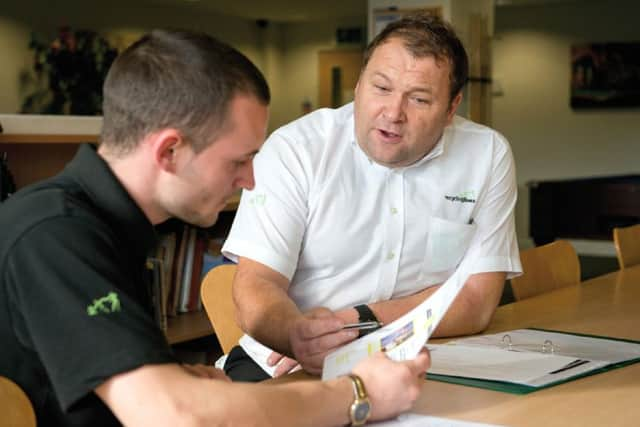Creating a new way of life through recycling


Prisoners from Kirkham Open Prison and the homeless have been helped into work and back into society by a pioneering partnership with a Lancashire charity.
“People couldn’t see how metal recycling and homelessness went together”, said Alasdair Jackson, operations director of Recycling Lives.
Advertisement
Hide AdAdvertisement
Hide AdThe link between the two isn’t apparant to most - in fact Alasdair confesses there were concerns at board level- but it time has told how successful the partnership has been.


For while the commerical side of the business deals with dismantling more than 2,000 televisions a day, scrapping cars and recycling the links of copper wiring and aluminium tubing, the charity side is busy preparing people for work, who may have been homeless or just released from prison.
And for those lucky enough to be accepted onto the charity’s six-step programme, the commercial business looks to promote from within.
Of 230 staff on the payroll, 90 to 100 of them came from a disadvantaged background - through the charity, having been to prison or long-term unemployed.
Advertisement
Hide AdAdvertisement
Hide AdNeil Flanagan, director of the charity which operates from Kirkham Prison and a head office in Preston, said: “Nine times out of 10 we promote from within, so you can see there is a way to better yourself.


“The training manager was in prison for 17 years for murder, and he’s the first person people will see.
“What we’re saying is that we will fix you, and that can be very difficult to comprehend. But these are the role models, and it helps people believe it.”
The drive behind this work comes from chief executive Steve Jackson OBE - an entrepreneur who vowed to give something back to society when he was able to.
Advertisement
Hide AdAdvertisement
Hide AdSteve and brother Danny ran family business Preston Recycling from a yard in Leyland and would often be exposed to homelessness.


Alasdair said: “In 2007, there was a conversation at board level and Steve wanted to do something.
“People couldn’t see how metal recycling and homelessness went together. It was a case of do we start a charity or buy the next generation recycling machine? For some crazy reason we decided on the charity.
“We’re quite open about the business side of things. To do what we do, we need more contracts.
Advertisement
Hide AdAdvertisement
Hide Ad“So by having the charity side of things, more people want to work with us because we can fulfil their Corporate and Social Responsibility (CSR).


“There are two distinct sides - the commercial business and the charity. They are different, but they work very closely together.”
In 2012 the first prison programme was set up after a good experience using Release on Temportary Licence (ROTL) workers in a car breaker’s yard seven years earlier.
Alasdair said: “We set up a scheme in Kirkham as a mirror image of what we do here in Preston.
Advertisement
Hide AdAdvertisement
Hide Ad“We had a corner of the laundry with five or six men, with the same benches and the same tools.
“We wanted TVs dismantled and if we trained people to do this job while they were inside, at the end of the sentence, they’d be able to jump straight in. It solved a HR problem for us.”
The scheme started with five men and it has built to 28, getting through 1,300 TVs a day and the charity winning the Queen’s Award on the back of it.
The charity is now working with more prisons in Wymott, Thorncross, Doncaster, Manchester, Styal Women’s Prison and Lancaster Farms.
Advertisement
Hide AdAdvertisement
Hide AdBut Neil is keen to stress the charity does not just deal with prisoners, they take on street homeless and other people who are long-term unemployed.
Referrals can be made through Preston Housing, but applicants are warned of the scheme’s strict policies including no drink or drugs, and the requirment to sign off benefits.
Instead they are given a weekly allowance funded through the work placements carried out by residents.
Neil said: “You can tell most of the time if they’re (the applicant) taking something.
Advertisement
Hide AdAdvertisement
Hide Ad“We ask them to be honest about drugs and drinking because we don’t want to set them up for a fall.
“We have people here who have come off hard drugs and they want a clean environment, they don’t want that around them. It’s also a work danger and an insurance issue.
“We ask people to go away and think about it. They are making a commitment to themselves.
“We ask them to come off benefits and we replace that with £40 a week allowance.
Advertisement
Hide AdAdvertisement
Hide Ad“Ten pounds of that goes into an account to furnish a new home for them when they finish the programme. They get new carpets, get time off the schedule to fully decorate. We want them to keep aspiring.”
Neil said those who have been in custody are often tidy, organised, used to structure and have a bank account. Street homeless people are often more chaotic, with no bank account and often no change of underwear.
If accepted, they are offered a structured six-stage programme lasting between nine and 10 months, which includes ‘quick-hit’ lessons with accredited training, shifts in work placements to ease them into the working environment and even essentials if needed, such as clothing and help setting up a bank account.
There is a firm daily routine, including having to be up at 7am and at breakfast by 7.30am.
Advertisement
Hide AdAdvertisement
Hide AdUp to 10 men are housed at the residential unit, where they sit down together as a community to eat, relax and talk to one another about their day.
One person is paid an extra £35 to be a ‘rep’, reporting back on the atmosphere in the house, the food and any concerns.
Neil said: “It’s about making this a home and people enjoying it. It needs to be clean and not smell. It’s not an extension of prison.”
The men are encouraged to go on social outings together, including hikes up Langdale Pike, but can’t discuss their backgrounds, with most not wanting to anyway.
Advertisement
Hide AdAdvertisement
Hide AdAlasdair said: “We don’t care about what you did, our job is to to turn you back into a civilised human being and stop re-offending.
“We have a 94 per cent success rate whereas the re-offending rate generally for people coming out of prison in the UK is 65 per cent.”
At the first stage of the process the men register with Select Move for social housing. By the end of stage six, they have been in the area for the requisite time to qualify for social housing.
Neilsaid : “The housing association know they’re getting good tenants, even if they’ve been in custody, because they’ve been with us for about nine months without incident.”
Advertisement
Hide AdAdvertisement
Hide AdAlasdair added: “We get good employees, they get good tenants.”
Neil: “They’ve worked so hard to get the house, they don’t want to lose it because they know it can lead to a downwards spiral.”
The charity work with charity Gift 92 to furnish properties and also with other small, local businesses - funded with the pot of money set aside from allowances. The men are also given time off their schedule to redecorate, with help from others. To ease the pressure, Recycling Lives also pays the first two weeks’ rent and send a food parcel from Fare Share so the men have enough in their cupboards for a week.
Fare Share is a recent enterprise under the charity umbrella, which deals with short-dated and overproduced items.
Advertisement
Hide AdAdvertisement
Hide AdFrom a warehouse at Red Scar Industrial Estate, charity staff work with 71 partners to supply items that would otherwise have ended up in landfill, even though they are indate and fit to eat.
The food is donated by several large supermarkets and local food maufacturers, booked in, and then other charities are asked for their preferences, which are then picked and collected.
A typical pallet costing a charity £25 will actually contain products with a shop retail value of £80.
• For more information on how to support the charity, contact Recycling Lives on 01772 654321 or by visiting: www.recyclinglives.com
How recycling lives gave us another chance
Advertisement
Hide AdAdvertisement
Hide AdJeff Green, 58 is the Fare Share manager. He heard about Recycling Lives from a prison officer while serving five years behind bars.
He said: “What it did for me was give me adjustment time after coming out of prison.
“I was away for five years and you can’t just come out and carry on, it takes an adjustment.
“I always say you need four things - you need time, work, relationships and your finances sorted, such as a bank account.
Advertisement
Hide AdAdvertisement
Hide Ad“This gives you time to make the right decision at the right time. You can’t just decide to get a job or a flat tomorrow, and single men coming out of custody are not a priority.”
Men taken in on the programme are asked to sign off benefits, something that Geoff said can be a struggle for some to understand.
He said: “Some people find it difficult to get their heads around that, but you have to look at the bigger picture. It’s a process of rehabilitation.
“A lot of organisations will treat you as an ex-offender, but we want to be treated as a normal human being.
Advertisement
Hide AdAdvertisement
Hide Ad“I didn’t want to be on my daughter’s settee. She had always known me to have businesses and my own place.
“So I’m glad I’ve been through this. It’s made me think about what’s important to me, how my relationships are with my family. It’s not all about what cat I drive or what suit I’m wearing. You do change.
“It’s a softly-controlled environment, you haven’t got the pressure of where’s your meal coming from.
“This should happen when you leave prison anyway, but doesn’t.”
Advertisement
Hide AdAdvertisement
Hide AdIan Green, 37 is the first on the scheme from Lancaster Farms prison.
He said: “I was in a bad way, my lifestyle was such that I was going nowhere very, very quickly.
“I was a high-risk offender using substances. As an ex-soldier I found it difficult to get employment, and I think a lot of it stemmed from that.”
He said: “Recycling Lives came into the prison and opened up a workshop recycling TV materials.
Advertisement
Hide AdAdvertisement
Hide Ad“I was employed as a dismantler and then promoted to peer mentor and then to shop supervisor.
“Then I was introduced to Neil and he said he thought they could do something for me when I was released, if I was willing to toe the line.
“They provided support, full-time employment and that snapped me out of my mundane lifestyle.
“I did think it was too good to be true at first, but I trusted the company and put my faith into it - and they haven’t let me down.”
Advertisement
Hide AdAdvertisement
Hide AdIn his first three weeks, Ian has worked in the charity’s kitchen, in the canteen and at Fare Share.
He said: “I’m being shown different areas and being asked where in the company I’d like to work. My target is plant machinery work, driving the cranes and forklift trucks.
“It’s quite a skilled job.
“Prisoners don’t just want unskilled jobs.”